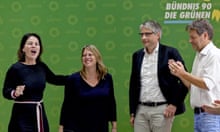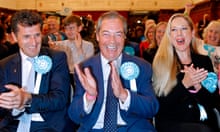In the end, a promised populist surge turned out to be more of a ripple. After months of boasts, bluster and apocalyptic rhetoric about the end of the old Europe, the far right made striking gains in some countries but losses in others.
There were expected strong showings for leading figures of the European far right, such as Hungary’s anti-immigration prime minister, Viktor Orbán, whose Fidesz party took more than half the vote, and Italy’s interior minister, Matteo Salvini, whose Lega was the biggest party. Marine Le Pen’s National Rally also narrowly topped the polls in France.
Salvini said the vote showed “Europe is changing”. Orbán spoke of “a new era in European politics”.
But although there were losses for traditional big parties in many countries, far from all of those votes went to far-right or populist parties, with greens and other pro-European forces also doing well.
Péter Krekó, who runs the Political Capital thinktank in Budapest, said: “I see a bit of a shift to the right but it’s not something that will endanger the operation of the EU. Pro-European forces were also mobilised in these elections.”
Nationalist and far-right parties will certainly have more representation in this European parliament than in any previous one. Salvini had attempted to capitalise on the mood, launching what he hoped would become a grand coalition before the vote, to bring all the anti-immigrant far-right parties under one umbrella.
But a combination of egos, policy differences on issues such as cooperation with Russia, and the existing network of European alliances meant even those far-right parties that have done well may struggle to build a coherent bloc in the new parliament.
Cas Mudde, an expert on populism and professor at the University of Georgia, said: “I don’t see one strong far-right group emerging soon.”
The electoral picture for far-right parties varied from country to country: in Slovenia, an anti-immigration party got the most number of votes, while in Slovakia, a progressive coalition that stood on a pro-European platform of tolerance came in first place. In Poland, the populist governing party won big but an extreme-right coalition failed to cross the 5% threshold.
In Belgium, the far-right Vlaams Belang party was on course to win two MEP seats. In Holland, the anti-Islam Freedom party was due to lose all four of its seats, including that of its leader, Geert Wilders. Thierry Baudet, the new Dutch populist leader who has been taking votes from Wilders, is due to take three seats, which is fewer than opinion polls suggested.

The Danish People’s party, which enthusiastically signed up to Salvini’s new coalition, was decimated at the polls and on course to lose three of its four existing seats. Germany’s AfD came fourth in the polls, winning a projected 11 seats.
Declaring victory outside the campaign headquarters of Fidesz, on the banks of the Danube in central Budapest on Sunday night, Orbán said the elections had given him a refreshed mandate to help build a different kind of Europe. Fidesz took 52% of the votes and 13 of Hungary’s 21 seats.
“We are small but we want to change Europe,” he said, describing the elections as “the beginning of a new era against migration”.
Fidesz is still hanging onto its membership of the centre-right European People’s party grouping by a thread but Orbán has called Salvini a “hero” and hinted in recent months he may want to join forces with Salvini’s new bloc after the elections.
Hungary’s foreign minister, Péter Szijjártó, said “the status quo is over” in the European parliament. “Until now, after European elections, the puzzle was quite simple, the EPP and the socialists came together, counted the votes and there was a comfortable majority … Now nobody is able to say what the final composition of the majority will look like.”
That much is true, and the new European parliament will have a different feel to the old one, as the grip of traditional, old parties is further weakened.
“The fragmentation of Europe’s party systems is yet again the big story, as it already was, or should have been, in 2014,” said Mudde. “There are fewer big parties, mainstream parties are now medium-sized, and some even small, while they are replaced by more and more medium-sized anti-establishment and new parties.”
Among the anti-immigration and far-right parties, there are fissures on various issues, with Polish and Scandinavian parties deeply sceptical of Salvini and Le Pen’s admiration for the Russian president, Vladimir Putin. Even if the far-right parties do vote together on certain issues, they will not necessarily be able to dominate the agenda.
Krekó said that even aggregating all the populist and anti-establishment parties from across the spectrum, they will not total more than one-third of all the seats in the new parliament. “Because most decisions only need a simple majority, all the talk of a blocking minority doesn’t make much sense,” he said.








